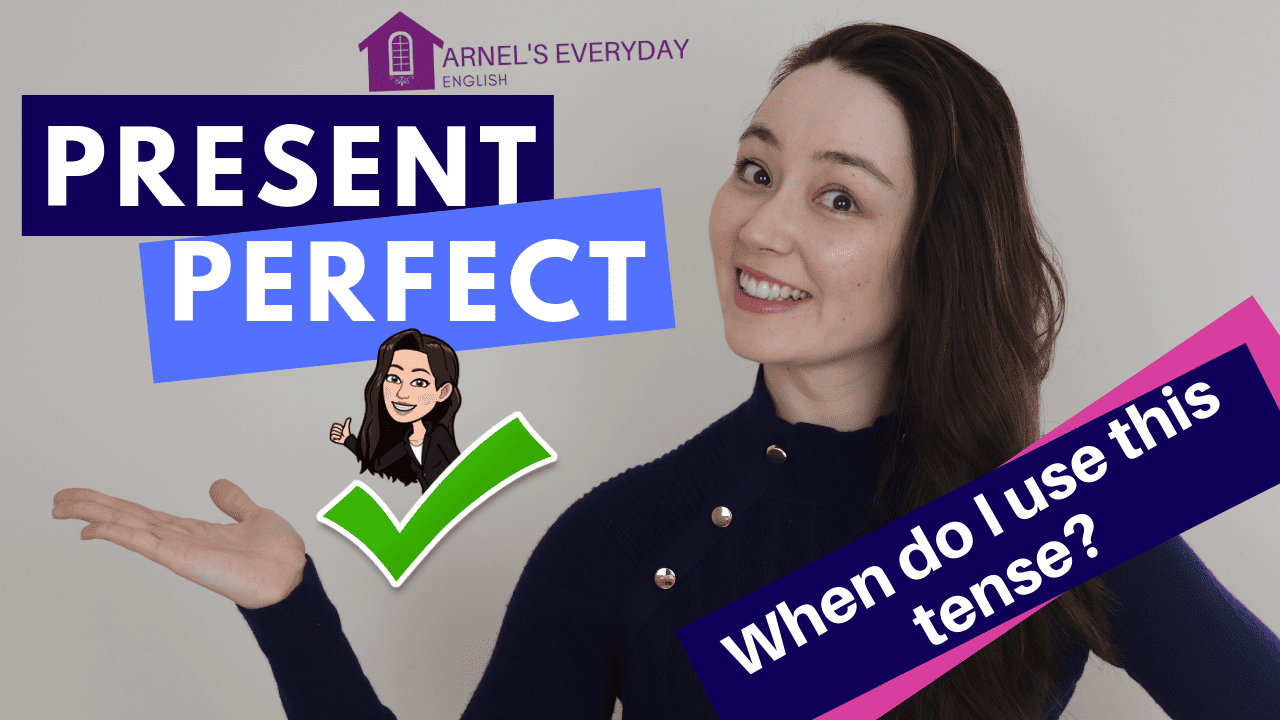When do we use the present perfect?
Why is the present perfect so confusing?
Why can’t I use past simple?
Today we are going to look at the present perfect in four easy steps.
1.the grammatical structure
2.a connection to the present
3.finished and unfinished time
(with the past simple)
4.typical mistakes
If you’re a more visual learner, watch the video! If you prefer reading, keep going…
the grammatical structure
We form the present perfect: have/has + past participle
I have
You have
He/She/It has
We have
They have
Remember, the ‘s’ in ‘has’ is pronounced ‘z’ like zebra.
What’s the past participle? It’s Verb #3:
#1 infinitive: eat
#2 past simple: ate
→#3 past participle: eaten
#1 infinitive: do
#2 past simple:did
→#3 past participle: done
#1 infinitive: dance
#2 past simple: danced
→#3 past participle: danced
Sentence Formation:
Affirmative:
I have eaten Vietnamese food several times.
Peter has eaten Vietnamese food several times
Negative:
I have not eaten Vietnamese food before.
Pete has not eaten Vietnamese food before.
Question:
Have you eaten Vietnamese food before?
Has Pete eaten Vietnamese food before?
In spoken English and in informal writing, it’s better to use contractions.
I have = I’ve
You have = you’ve
He has = he’s
She has = she’s
It has = it’s
We have = we’ve
They have = they’ve
I have not = I haven’t
You have not = You haven’t
He/She/It has not = He/she/it hasn’t
We have not = haven’t
They have not = haven’t
A connection to the present
We use the ‘present perfect’ when we want to connect a past action to the present.
This past action has a connection to the present or an impact on the present.
I’ve lived in New York for five years.
What’s the connection to the present? Now, I still live in New York.
Will this action continue in the future? Maybe, but this information is not important.
Pete and I have been together for eight years.
What’s the connection to the present? Now, we are still married.
Will this action continue in the future? Maybe, but this information is not important grammatically.
I’ve had my dog Bubbles since I was 15.
What’s the connection to the present? Now, I still have Bubbles.
Will this action continue in the future? Maybe, but this information is not important.
With the present perfect we are really trying to link the past to the present:
Riley’s lost his job.
What’s the impact on the present? Now, he doesn’t have a job and he’s stressed. He needs to start looking for a new one.
I can’t find my keys. I’ve looked everywhere.
What’s the impact on the present? Now, I can’t get in my house. Now I don’t know what to do.
You’ll see this grammar a lot in the news. Why? Because past actions have present impacts.
The government has decided to increase taxes.
The decision was made in the past.
What’s the impact on the present? Now, taxes are going up.
Heavy rain has caused flooding in many areas.
What’s the impact on the present? People need help. Their homes have been destroyed. Water is everywhere.
finished and unfinished time
We use the present perfect for past experiences.
For example:
I’ve been to France twice.
My best friend and I have watched Titanic so many times.
I’ve met the pope.
There are all life experiences. Things we do in our life.
When did these things happen?
The time is not important. We do not use a specific finished time with the present perfect.
I’ve been to France twice in 2015 and 2016.Now it’s 2019. 2015 and 2016 are finished times.
My best friend and I have watched Titanic so many times when we were in high school.
Now I’m not in high school. That time is finished.
Did you know, I’ve met the pope in July.
Now it’s September. ‘July’ is finished.
If you want to use a specific finished time, use the past simple.
☑I went to France in 2015 and 2016.
☑We watched Titanic so many times in high school.
☑I met the pope in July.
You can use the present perfect with unfinished time.
What is unfinished time?
Today’s the 8th of March. Is the month finished? No, it’s only the 8th. ‘This month’ is an unfinished time.
☑I haven’t been to the gym this month.
Today it’s Wednesday. Is the week finished? No, it’s only Wednesday. ‘This week’ is an unfinished time.
☑My flatmate and I have cooked Indian food twice this week.
It’s now 2 PM. Is ‘today’ finished? No, it’s only the afternoon.
☑I’ve written over 50 emails today.
Now, I’m 30. Is my life finished? NO!!!! ‘My life’ is an unfinished time.
☑I’ve travelled a lot in my life.
typical mistakes
1.Using the verb #2 instead of verb #3. This is a problem with irregular verbs.
I have went..
☑I have gone
She has saw…
☑She has seen
2.Using present perfect with a specific finished time.
Last night I have gone to a gig with some friends.
☑Last night I went to a gig with some friends.
3. The specific finished time, does not need to be in the same sentence, but in context. Here’s a conversation:
Anna: Have you been to that Greek restaurant Heracles?
Clare: Oh you, you mean the one next to the train station?
Anna: Yeah, that’s the one.
Clare: Yes actually, my boyfriend and I went there last week.
(We use the present perfect to start, because we are more interested in the experience, not the time. Later in the conversation, we use past simple. Why? ‘Because ‘last week’ is a specific time. Okay…)
Anna: How was the restaurant?
Clare: The food was pretty good. I ordered the lamb platter.
(Now, the conversation continues in the simple past. Why? Because we are still talking about ‘last week’.)










